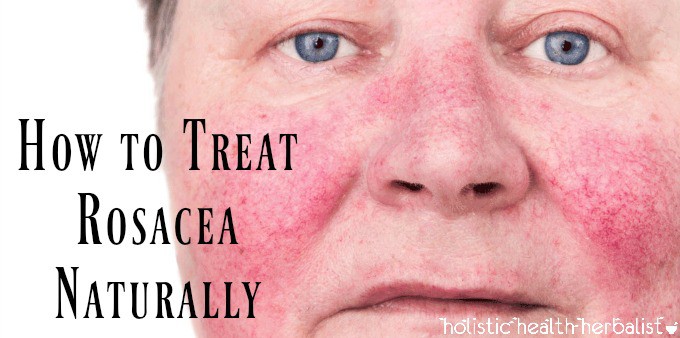
Rosacea is an inflammatory skin condition that affects between 0.5-10% of the world’s population (16 million of those being American), so to say it’s common is a bit of an understatement. This skin disorder used to primarily affect people over the age of 30, but in more recent years, rosacea can be seen as soon as one’s early teens and twenties.
The rosy rash that develops on the face as the result of inflammation in the skin is something that affects self-confidence and one’s quality of life. So today, I want to teach you how to best treat rosacea naturally so that you can better support your skin’s health from the inside out and perhaps even reverse the symptoms of rosacea using a holistic approach.
How to Treat Rosacea Naturally
Before we begin, let’s delve into some more information about rosacea so that you have a strong foundation of knowledge to work from, because, believe it or not, 95% of people who have rosacea weren’t even aware they had this condition prior to diagnosis. That’s a lot!
So, let’s start by getting to know our adversary so that we can better treat it and potentially reverse it using the right tools.
What is Rosacea?
Rosacea is an inflammatory skin condition that manifests in a red rash on the nose, cheeks, forehead, chin, and even the eyes (known as ocular rosacea) and chest.
These legions often include small, red, pus-filled bumps which is why so many mistake rosacea as just a bad case of acne.
Unlike acne, however, rosacea does not produce whiteheads or blackheads. In fact, it rarely appears during adolescent years… though that seems to be changing.
Typically, rosacea develops during a person’s thirties and forties beginning with a slight pinkish blush to the skin that progresses into permanent thickening of the skin and redness, especially on the nose area if left untreated.
Women are more likely to develop rosacea than men while men who do develop the condition tend to have more severe cases – sometimes as severe as rhinophyma or a painful disfiguration of the nose.
The Symptoms of Rosacea
Most people think rosacea is just a reddening of the skin and nothing more. However, symptoms often go beyond this.
The most common symptoms of rosacea include:
• Acne-like breakouts
• Bumpy skin texture
• Dry, rough, scaly skin patches
• Itchy skin
• Large inflamed pores
• Painful, inflamed skin
• Raised patches of skin (called plaques)
• Red pimples or welts
• Redness across the nose, cheeks, forehead, and/or chin
• Sensitive eyes including symptoms of dryness, redness, stinging, itchiness, blurred vision, pain, and watery or bloodshot eyes
• Sensitivity to sunlight, hot and cold temperatures, and skincare product ingredients
• Spider veins and/or broken blood vessels on the face
• Stinging or burning sensations of the skin
• Thick areas of the skin that can appear on and around the nose, cheeks, forehead, or chin area
Anything that can cause blood vessels to dilate in the face can also cause a flare-up of symptoms.
Common rosacea triggers include:
• Coffee
• Consumption of alcoholic beverages
• Extreme temperatures (hot or cold)
• Fatty foods
• Harsh winds
• Hot drinks
• Spicy foods
• Stress and anxiety
• Sun exposure
Although these triggers will differ from person to person, the key is to single out and eliminate triggers as much as possible to help prevent overt dilation of the blood vessels since each time this happens, they lose some elasticity. This loss of elasticity is what ultimately causes broken blood vessels on the face because they remain in a constant dilated state – hence the redness rosacea is known for.
The symptoms of mild rosacea start out as a small rash, a small patch of bumps, or redness on the skin before spreading and becoming progressively worse. Symptoms can also come and go depending on your emotional state, exposure to triggers, and general lifestyle.
What Are the Root Causes Rosacea?
The main root causes of rosacea include:
• A diet high in fat and low in fiber
• Constipation and generally sluggish digestion
• Dysbiosis in the gut (lack of bacterial diversity in the gut and imbalanced levels of gut bacteria)
• Food allergies and sensitivities
• Hormonal imbalance
• Low levels of stomach acid
• Nutritional deficiencies (especially trace minerals and B Vitamins)
• Reaction to synthetic hormones like birth control and hormone replacement therapies
• Repeated exposure to triggers
Most skin conditions are a result of underlying digestive issues, and rosacea is certainly no exception.
In fact, many rosacea sufferers have been found to have low stomach acid levels which point to low absorption of nutrients, particularly trace minerals and B Vitamins. The gut can also be overgrown with bacteria that may be triggering inflammation in the skin.
Having a sluggish digestive system with frequent bouts of constipation will also affect digestive health and the overall condition of our skin. When digestion is impaired, the skin is often the first to show signs of the body’s attempt to detox and process waste. You can often see this as an imbalance in regards to the bacteria in the gut responsible for assisting the detox process.
Those who suffer from leaky gut and those who have food allergies are also more prone to developing skin conditions like rosacea.
Hormonal imbalance is another factor to consider if you find that your rosacea tends to flare during specific times of the month. This can especially impact those going through peri-menopause and menopause where hormones levels start to decline.
Some women find relief after getting their hormones under control, ye there are those who still suffer from flare-ups even when on hormonal replacement therapies.
Conventionally, rosacea is treated with antibiotics which must be taken continuously. I for one think this is a terrible idea since rosacea is often exacerbated by a lack of bacterial diversity in the gut!
The 4 Types of Rosacea
Believe it or not, there are actually 4 types of rosacea!
However, they all share one commonality – inflammation that manifests as a red rash.
I have included a few rosacea pictures below so that you can see the difference between them.
1. Erythematotelangiectatic Rosacea
This type of rosacea is characterized by red and flushed skin with visible blood vessels. This is the most common form of rosacea.
2. Ocular Rosacea
Ocular rosacea occurs around the eyes and is known to cause redness, itchiness, sensitivity, pain, and a watery bloodshot look to the eyes. It can also cause blurred vision.
3. Papulopustular Rosacea
This is the form of rosacea that often confuses people into believing it is acne related since it is characterized by acne-like breakouts, persistent redness, papules (bumps), and pustules (pimples). This type is common among women in their 30s and 40s.
4. Phymatous Rosacea
Phymatous rosacea includes symptoms of fluid retention (edema), swelling, thickening of the skin around the nose area, and redness.
Rosacea VS Acne
Like I’ve stated earlier, many people believe that their rosacea is actually acne because so many of the symptoms are similar.
However, one sure fire way to tell the difference between the two is that rosacea is a chronic condition that generally occurs much later in life than acne. It also had no whiteheads or blackheads and will look like a blushing of the skin in the central area of the face, not just red or inflamed pimples. The texture of the skin will often look like raised red bumps and will often be accompanied by broken blood vessels.
Acne can occur anywhere on the body and is characterized by a variety of forms like blackheads, whiteheads, papules, pustules, bumps, and nodules on different areas of the face and body.
How to Treat Rosacea Naturally with a Holistic Approach
So, now that you are armed with knowledge, it’s time to get into the actual treatment protocol you can follow to help alleviate symptoms.
First and foremost is diet.
As we learned, rosacea is an inflammatory condition of the skin that is largely influenced by what we put into our bodies.
Therefore, it only makes sense that you need to cut out inflammatory food and drink from your diet in order to eliminate those triggers. This is especially important if you suffer from leaky gut, ulcerative colitis, SIBO, Crohn’s disease, and celiac disease as these conditions have heightened levels of immunoreactive neurons that increase inflammation in the body.
Cutting out processed foods like bread, pasta, cereals, soft drinks, candy, baked goods, etc. as well as foods high in sugar, alcohol, and caffeine is a great place to start.
You should be eating lots of fresh fruits and vegetables, nuts, sprouts, and seeds daily to help up your bacteria diversity and nutrient intake. Dark leafy greens are especially noted for their high content of trace minerals, something that all rosacea sufferers need.
Some of the best anti-inflammatory foods you can eat include:
• Beets
• Blueberries
• Bok choy
• Bone broth
• Broccoli
• Celery
• Chia seeds
• Coconut oil
• Dark leafy greens
• Ginger root
• Pineapple
• Turmeric
• Walnuts
• Wild salmon
Getting enough fiber in your diet will ensure that your digestive system is working smoothly. Not only does fiber help detoxify the body, it also ensures that you will be having regular bowel movements. Sluggish digestion is one of the leading triggers of rosacea, so I implore you not to skip this step.
Taking a high-quality probiotic is another way to support gut bacteria diversity and will also help your body digest food and absorb nutrients. This is especially important if you are already on an antibiotic protocol. I cannot stress this enough!
High Fiber Foods Include:
• Artichokes
• Beans and lentils
• Berries
• Cruciferous vegetables
• Figs
• Prunes
• Quinoa
• Root vegetables
• Squash
Eating healthy sources of omega fatty acids is a great way to reduce inflammation naturally. Take a high-quality fish oil or vegan equivalent daily to help balance your body’s inflammation response.
Drinking plenty of water (not from the tap) is another key element in the body’s ability to detox and remove wastes.
The Best Herbs and Supplements for Rosacea
B-Complex
Many who suffer from rosacea have a deficiency in b-vitamins. Take 50mg of B-Complex 1-2 times daily to improve symptoms.
Betaine Hydrochloride
This is one of my favorite digestive supplements. Betaine hydrochloride helps improve and increase stomach acidity, as a result, digestion is much better especially when it comes to proteins. Having proper stomach acid levels for optimal digestion will also ensure that bacteria overgrowth in the gut is controlled.
Take 1-3 capsules of betaine hydrochloride with meals. Start with one, then up it as necessary. If you feel a warming or burning sensation, decrease the dose.
Burdock Root
Burdock is a particularly detoxifying herb often used for many types of chronic skin conditions, including rosacea. It helps support the liver and purifies the blood and acts as an anti-inflammatory.
Take 300mg daily or 3ml of burdock tincture three times daily.
Digestive Enzymes
Enzymes are essential for every digestive complaint or skin condition as they help break up our food in the digestive tract and help the body assimilate nutrients.
Since those with rosacea often have deficiencies, taking enzymes with your meals is a must.
Take 1-2 capsules of a full spectrum digestive enzyme with every meal.
Gentian Root
Gentian is a bitter herb that helps stimulate the release of bile and other gastric juices that help digest the foods we eat.
Since you actually need to taste the bitter flavor of this herb for it to work, it is best taken in a little water as a tincture (10-20 drops) before meals.
Milk Thistle
Milk thistle is another herb that’s excellent for liver support and detox and has shown great results when it comes to chronic skin conditions, including acne and rosacea.
Take 250mg three times daily. Make sure it contains 80-85% silymarin extract for best results.
Vitamin B 12
Taking 400-800mcg of Vitamin B12 during a rosacea flare-up can help reduce symptoms and future flare-ups.
It is best taken sublingually.
Homeopathic Remedies for Rosacea
Use either 6C or 30C strength three times daily for three weeks.
Arsenicum Album
Arsenicum Album is for flaky, dry, hot feeling skin where the person feels anxious and restless, gets cold easily, and prefers warm beverages.
Hepar Sulphuris
Hepar Sulphuris is indicated for those who have painful pus-filled spots where a warm compress is soothing.
Pulsatilla
Pulsatilla is specifically for rosacea associated with hormone imbalance, changes, puberty, menstrual time of the month, or menopause where the woman feels emotional, weepy, and sensitive. They crave sweets and feel more at ease in fresh air.
Sepia
Sepia is also for rosacea associated with hormonal imbalance except that the woman feels irritable and fatigued. She may also crave chocolate, salty, and/or sour foods and gets cold easily.
Sulphur
Sulphur is for treating chronic inflammation and redness that is aggravated by the sun, hot baths and showers, and warm weather. The person often thirsts for cold drinks and prefers cold weather.
Acupressure for Rosacea
Stomach 36 (St36)
This point improves digestion and the absorption of nutrients.
Spleen 10 (Sp10)
This point clears excess heat from the blood.
Stomach 3 (St3)
Helps clear up rosacea blemishes.
Bladder 10 (B10)
Helps is rosacea is aggravated by stress.
Essential Oils for Rosacea
The best essential oils to use are those with strong anti-inflammatory properties.
These include:
• German chamomile
• Helichrysum
• Lavender
• Manuka
• Roman chamomile
It’s important to use well-diluted formulas so that you do not further irritate the skin and use very little. You don’t want to be dragging the delicate skin when applying healing serums.
I recommend adding 2 drops of any of the above essential oil to 1oz of jojoba oil. Spritz the face with rose water (which will further alleviate inflammation) and apply 1 drop of serum to the skin.
The rose water will make applying the serum much easier and with less drag.
These oils will also help control demodex mites and other microbes thought to aggravate rosacea.
In what ways have you been able to treat rosacea naturally? Please share in the comments below!
You may also enjoy reading:
The Best Remedies for Treating Glaucoma Naturally
10 Signs You Have Adrenal Burnout and How to Treat it Naturally
How to Treat Hormonal Acne Naturally
How to Treat PCOS Naturally with Essential Oils
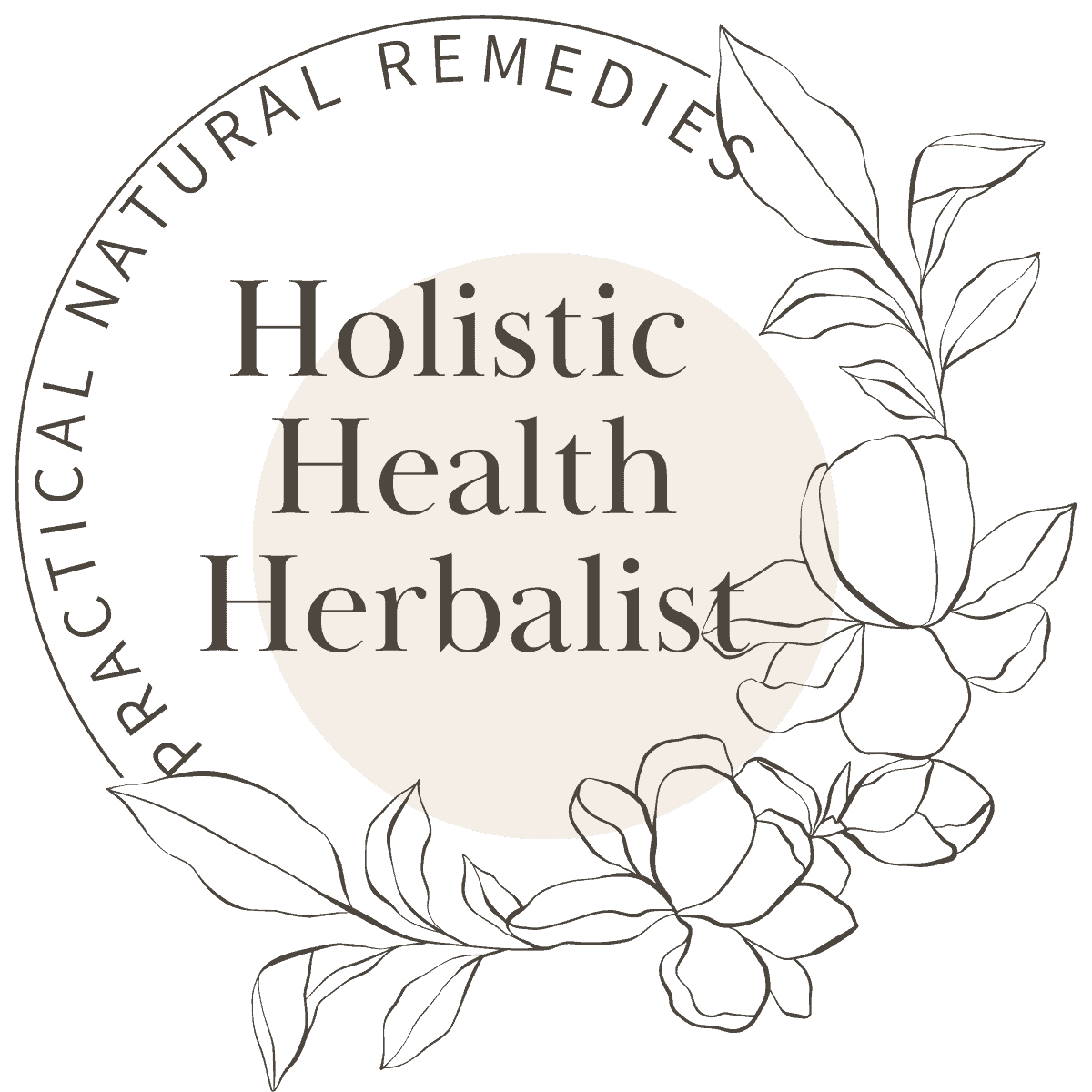

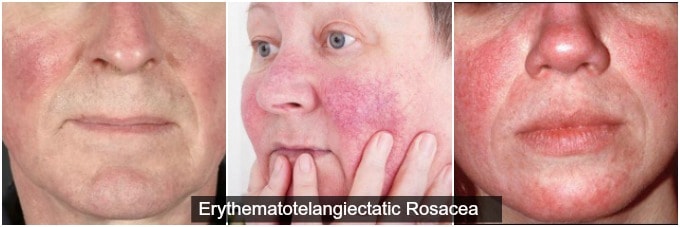
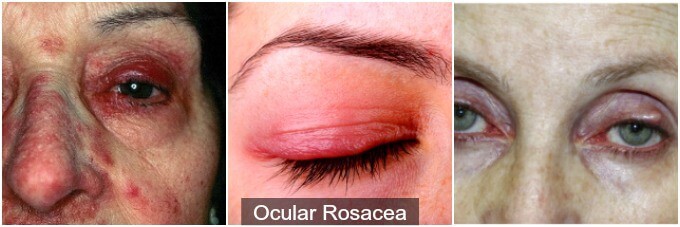
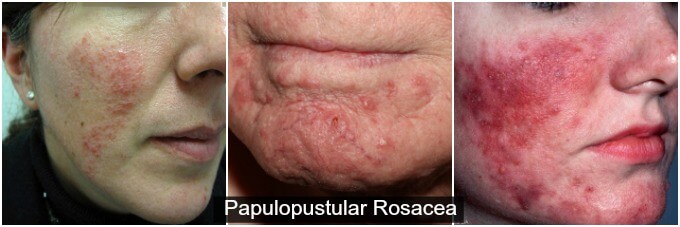
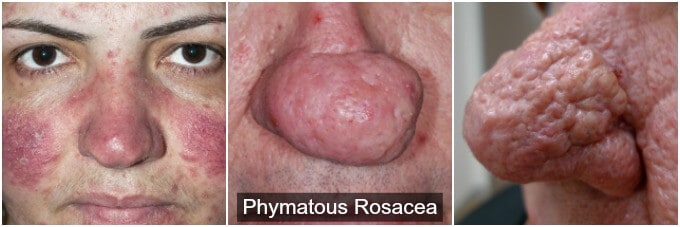
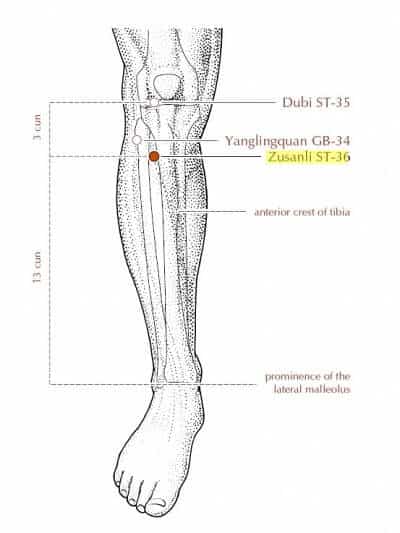
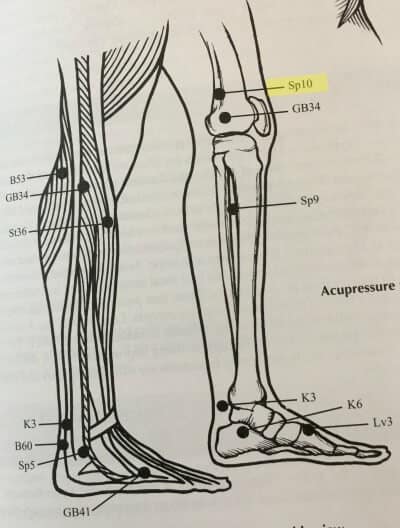


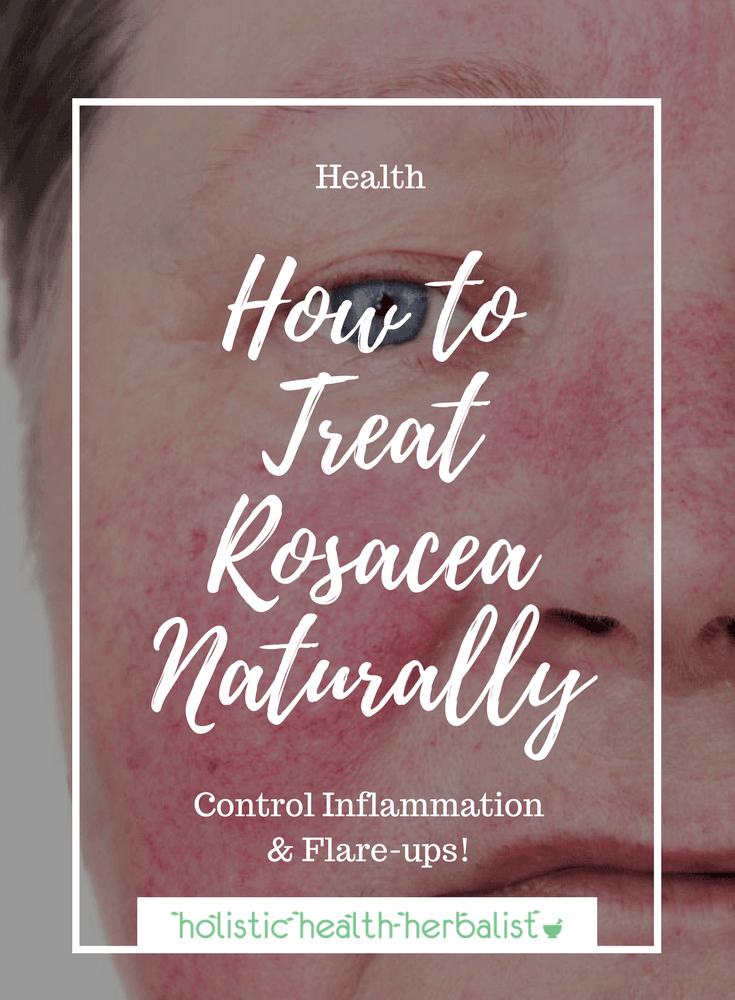
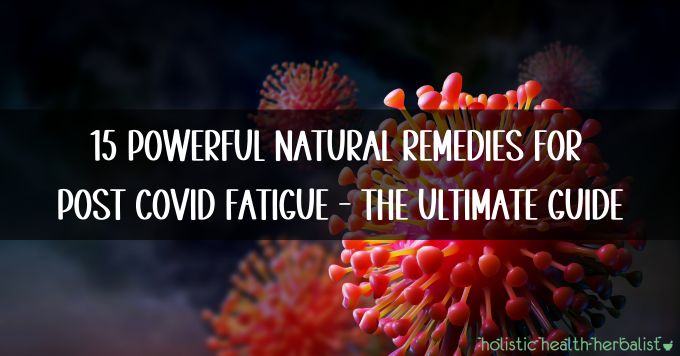
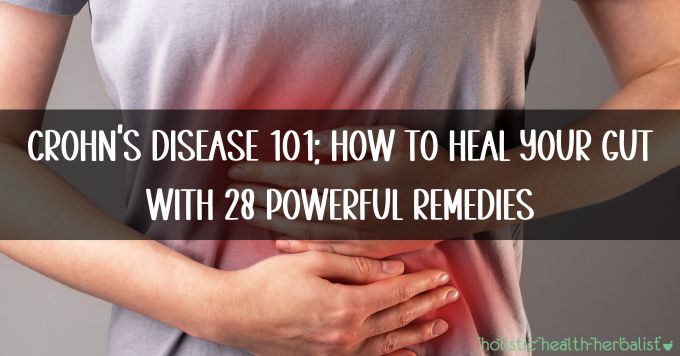
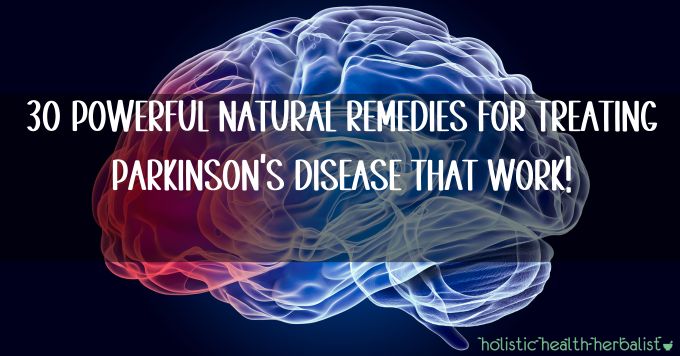
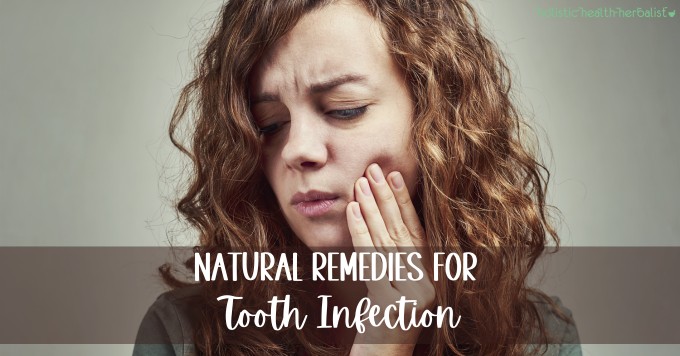
Ali says
It sounds crazy, but Nivea Q10 Night Cream really helps keep my rosacea under control. My face still gets red but the bumpiness and itch are much better with the cream. Unfortunately they have just changed the formula so Im hoping when I get to the new jar it still works. Cleansing morning and night with a muslin cloth and gentle cleanser of some sort also helps, seems to minimise the sandpaper feel. If Im lazy and don't cleanse at night, my face is worse the next day. Wine also makes it worse. Keen to try some of the other suggestions here, thanks for a great article.
Lori says
Hi Tash
I was curious what you would use to treat only the small red blood vessels on my cheeks and nose naturally? How would you wash your skin with out irritation? Can they go away completely?
Thanks!
Patty says
CBD oil cured me. I do everything natural. Exercise, eat right, vitamins, read labels, cook my own food. At age 66 I retired. Still did all right things, less active, still eat whole foods, but different. I get rosacea. Without getting into everything I'll just explain end results.... A friend told me to get CBD oil to help with sleep. I take 250mg, half dropper full at night, the rosacea goes away. Approx five months now, my skin is still beautiful and I'm still taking CBD oil and will continue AND have notice other benefits. My grandson now takes it for his acne. Be sure to research CBD oil, some companies are better.
Cat says
I tried many of the suggestions above. I had terrible reactions to medications that did nothing other than make me sick, essential oils didn’t work, neither did using products specially for rosacea (sulphur soap, creams like peony etc). I had horrible itchy pustules that wouldn’t go away until I used selenium sulphide shampoo to clean my face once a day. All the dry skin flaked off over two weeks and the redness and pustules went. Definitely worth trying, you need to stick with it for at least two weeks to see results, with no horrible side effects. I now suspect a hormone imbalance as a trigger, probably due to a prolonged unintentional very low fat diet.
clara says
I find none of the causes you mention cause my rosascea. I eat extremely clean and have no problem. However when i do high impact excercise I have a raging bout
SonofGod says
For all of you: doxycycline once a day 100mg after lunch (no with milk products or milk) for 3 months and then stop!! First 10-15 you will have hot flashes and then everything will start to heal properly. I am not against herbs and eliminations of triggers. Just do it together, it will be more powerful!!Enjoy your day!!!
Annette says
I haven't had a flare up in 13 years and had this DOWN PAT...but, alas, hormonal changes I guess make for a different version of my life. My usual go-to was apple cider vinegar (1 part ACV to 8 parts water, although I'd just wet a cotton ball and add a splash of ACV instead of measuring). It worked every time. 15 years ago, it was Head & Shoulders on a bump here & there. Now? Trying to eat clean as it's a gut issue I'm sure and nothing's working. Going to derm. today for a topical ointment b/c I can't take it anymore.
Patti Tackett says
Just was diagnosed with ocular rosacea. It has caused headaches and blurred vision. Any ideas for natural remedies?
Cynthia says
I have ocular rosacea, green vege smoothies, fish. Omega 3's by way of foods is best. Also replenish good bacteria by eating raw fermented vegetables and taking acidophilus. My vision has returned to normal. Best wishes
Darla says
I am very frustrated at this time and overwhelmed. I have red, scaly and cracked areas . The top of my nose between my eyes , and just inside, dark circles and a brownish color around both eyes. Dont want to put all that chemical junk on like creme and steroids. Looked at natural things you have recommended. I'm just so overwhelmed I'm crying. Don't know where to start. DARLA
Tash says
Hi Darla!
So sorry to hear about your struggles! Have you been able to pinpoint what triggered it? That would be the best place to start! Also, look into any natural topical treatment you can. Everyone is different, so you will just need to decide on what to try first. I wish you luck!
Kami says
Hi. I love your post.
I Will follow the diet for sure.
im currently 19 weeks pregnant and not sure about All the suplements you have mentioned. Can you give Me some guidance and safety on usung all those herbs and vitamins. My rosacea is currently at its worst right now. My skin burns and it’s super itchy. Please help.
Kami
Tash says
I would consult with your doctor first before taking any type of herbs or supplements during pregnancy. You can, however, try to find natural topical treatments that will help alleviate your symptoms. Make sure you are eating a good and clean diet if you can, this is super important!
Mrs Spaan says
Hi I am not 100% sure I have any of the above.
It starts usually with a miniscule water blister really tiny smaller than a pin prick. But itches like crazy. I usually scratch til it break then some redness appears which also itches like mad. Never had huge red patches scales
but seems to be getting worse. Any suggestions. I am 75
stevanne says
Hi Tash
thanks for helpful info
flare up first about 4 years ago
skin ok before/exposed to lots of sun before use of sun screen
dermatologist prescribed metronifazole and then finacea
both burned and made skin sensitive and did not clear up or cure
i tried coconut oil and then caster oil but did not clear or cure
flare up again
trying to cure cough sat in sun for short while and breathed steam under towel
going for allergy test soon
What to test?
many suggestions offered
what to try next?
thanks!!
Nans says
Hi,
I have had decent results by using saltwater, except when the flare up is particularly severe. But I am eager to try some of your suggestions. Thanks!
Lisa says
I've heard about red light therapy for rosacea, and for some people, it seems to work very well. I saw it here: https://www.infrared-light-therapy.com/red-light-therapy-rosacea/
Lisa says
My nose has really been affected by roseaca. It ha much fatter and round than it ever used to be. I used to like my nose but now feel it has really changed my look. I actually don't recognize it in pictures anymore. Not happy! What can be done to make it look more feminine again? Laser?
Tash says
Hi Lisa!
I'm not sure 🙁 It may be worth asking your doctor what options may be available. Best of luck!
louise says
I have just book marked your site as the information you provide is incredible, I also read your article on Ashwaganda and I will share it with others as it's so well written and has information that I haven't found anywhere else. Do you have Instagram or fb as I would follow you.
Louise
Tash says
I'm more active on facebook! I have a link in the sidebar under the author profile 🙂
Linnea says
I have been using a clay based face wash now for a few months, and it seems to be wonderful - it both removes excess oil but also does not dry out my skin. The face wash mix comes as a powder, and you add just a few drops of water in your hand before gently washing your face. The mix includes kaolin clay, dried lavender and rose, ground almonds and ground oats (all organic). I've also been doing the suggested spritz with rose water and the jojoba oil/essential oils mix to moisturize after I wash my face, morning and night, and it seems to be helping (or at least not making things worse). I eat an extremely clean diet (vegan, gluten free, grain free, sugar free) and this also helps tremendously. I get acne as well, usually associated with my menstrual cycle, but this seems to be much better with the clean eating. Good luck to everyone else, and I'm happy to find sites like this that are encouraging, as when I have a skin flare up it is always discouraging, no matter that I know all the healthy practices I am doing.
KRW says
What's the name of the face wash and where do you get it? THX!
Celanie Almquist says
Hi Tash,
There are a lot of different options to add to your diet for helping rosacea, it’s helpful but a bit overwhelming. As supplements can be very expensive, what of these things would be enough. Should we try one at a time? If your having chia/ tumeric everyday and salmon once a week, do you still need to add all the supplements. Which supplement would you try first?
?
Tash says
I would go with any of the digestive supplements first and see if those make a difference. Be sure you are eating a generally whole foods diet with minimally processed foods 🙂 It's okay if you can't "do all the things", just try things one at a time to see if they help your unique situation.
Joss` says
Thank you for this information. I am new to this and was instructed by my doctor that this was skin damage due to the sun. I currently have eczema, so I thought this was associated with it, until doctors kept saying I have roscea. They just told me to deal with it. I have been trying tea oil, but have not receive any results. No one understands in this society, unless you deal with it. So I greatly appreciate that someone is willing to help us.
Lisa says
What do you think of ozonated oils for rosacea?
Tash says
I think ozonated oils are amazing for healing the skin! The only downside is their smell 🙁
Nikita says
For rosacea my one of friends recommended dermalmd skin lightening serum to me and I am so glad that they did. I’ve had melasma for over 5 years now and have tried just about everything. I was starting to think that nothing would work until I found this! I’ve been using it for a month now and have seen major major improvement. Just look at my pics. And, yes, there was a little dry skin and some peeling that went along with using this serum. So worth it. Love love love this stuff. A real godsend.
Fumi says
Thanks for a great article! I have been suffering from rosacea for about 10 years or so and I get bad flare ups every few years... I have had the latest flare up about a month ago and I have been using The Ordinary’s Niacinamide and Zinc serum which seems to calm my inflamed and pimply face. By the way I’m not a sales person from the Ordinary. I just want to share my experience with this serum as I know how annoying to have this debilitating skin condition! I hope we all get a cure from this skin condition in the future so that we can lead a normal life!!
Tash says
Thank you for the great tips Fumi! I actually really like that serum as well!
Amber says
I'm curious on your thoughts on making a a mask with a little arrowroot to thicken, with the majority of ingredients being Manuka honey and coconut oil. Leave it on for 20 minutes... Like you would be oil pulling... Which may also help btw... Then wash it off with a cleanser made of Rose hydrosol and a little baby unscented Castile soap. I've been messing around with ingredients and after reading your post, I am pondering this as a facial treatment. I also have a balm that I made for a totally different thing (carpal tunnel) that has improved my psoriasis, several of my friends eczema and now I have a friend trying it out on her rosacea... The ingredients are comfrey lead and fresh grated ginger root infused into coconut oil and grapeseed oil, then strained and mixed with beeswax and mango butter... Then I add as it's coming a few of these essential oils that you listed... Which when put all together makes a balm that has a wonderful smell and is gentle on skin. It is moisturizing and healing. Oh and I put a teaspoon of vitamin e oil in it. I forgot that part.
Anyways. What are your thoughts on those ingredients for a mask and cleanser? I like to get other ppls input when I make something for something I don't know alot about. Since I don't suffer from rosacea, I would hate to aggravate it worse for someone. But what I'm reading, through several posts, I'm curious if these are a good place to start to help her
Tash says
Hi Amber!
That balm sounds wonderful! As for the mask and cleanser, it sounds pretty gentle and would be worth a try in my book 🙂 It is always a journey to find that perfect balance! Just make sure to keep the skin moisturized after you cleanse away the mask - perhaps with some of that mango butter you have used in the balm or the grapeseed oil.
MaryCat says
Coconut oil is not good for people with skin issues like rosacea or acne as it is non-comedigenic. It actually worsened my rosacea, and that was a lessen I could have lived without.
Annie says
Thanks for the tips! It is hard to live with rosacea, the things we should be avoiding are actually impossible to avoid and I believe those things cant be the only cause.
I have switched onto using natural cosmetics and my skin has gone ballistic. I’m having a bad flare up at the moment but noticed that keeping things to minimum like using non scented moisturiser and really gentle face wash helps keeping my skin calmer. I think because of my bad flare up now my skin gets irritated even with oil serums. So I have decided to try to eliminate them from my routine also. Maybe I can add them back later once my flare up is gone entirely. For my digestion I’m taking a new strong probiotic and will start to take apple cider vinegar soon also.
I am drinking coffee and eating some spicy food but think alcohol and the oils on my skin might be causing the flare up. I have stopped eating chocolate already and have been on non dairy and glutein free diet so I am really keeping my fingers crossed that my skin will calm down soon as I am quite tired of the continuous itch and bumps and pustules I keep getting one after another.:( But if my skin does not calm down soon, I have to go to get my Soolantra recipe renewed as that is then the next option. I had it last year but I really would like to stay with the holistic approach now...Well let’s hope some miracle will calm down my angry face...really hoping so.
Tash says
Oh no!
I hope your flare-up calms down soon! Rosacea can be such a bear to deal with and it's really hard to figure out what keeps it from flaring. Have you ever had an allergy test done?
Annie says
Long time ago I had allergy tests but apart from some hays I didnt have any other allergies.
I am now back on Soolantra but I have also gotten an appointment with nutritionist who hopefully will help me to find a good diet plan to control my rosacea. She already have instructed me to take some curcumin drops and Restore mineral supplement as well as strong probiotics. She also thinks that my rosacea is due to hormonal imbalance and I think she is right as I also suffer from hormonal acne mainly on my chin area.
Anyways fortunately my flare up is gone now, it calmed down with Soolantra but I am still hoping I get to find a way to cure my body and especially gut. I am still drinking coffee but other stuff that may cause flare ups I have taken out from my diet. I also go to yin yoga to calm my body down in addition to other exercise which I have been doing anyways.
As for my skincare, I try to keep it simple and not to add many products into my routine. My skin loves unscented rose water and serum and I have also found a new get wash that does not seem to irritate my skin. My skin is quite funny as it can get irritated also by too gentle wash and the gel texture is best for my skin as long as it is effective but gentle.
So there you have it. I am keeping my fingers crossed that after my 12 weeks of Soolantra (I’m on week 6 or 7 now) no longer have to use it but I finally find a a remedy through diet and lifestyle changes and this in turn will help my body to find a balance and make my rosacea inactive,
Cindy says
Enjoy your articles, thank you! Regarding Rosacea .... Would using a bentonite clay mask benefit or harm the face making the rosacea better or worse? Appreciate it!
Tash says
Hi Cindy!
Bentonite clay is one of the most powerful facial clays so I would probably not use it on any area where rosacea is present. The most gentle clay is white kaolin clay which may be alright to use. I would test it out on a small area first before applying it to the entire face 🙂
Julie Smith says
Thank you so much for your thorough article on both the root causes and remedies for Rosacea. What skin care products and foundations are best for people with Rosacea? Thank you!
Tash says
Hi Julie!
It completely depends on your skin type 🙂 People with rosacea will still have distinctive differences like oily, dry, or combination skin. Since you also have the added sensitivity, you would want to aim for products that are as natural as possible and suited for sensitive skin. if you know what works for your skin, look for skincare that is made with those ingredients. As for foundation brands, 100% Pure, Mineral Fusion, and Gabriel are good places to start 🙂
Healthy Natural Way says
Wonderful Article